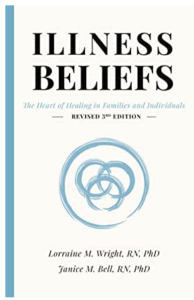Beliefs are the blueprint from which we construct our lives and intermingle them with others. Beliefs are central to family health and healing. What one believes about the etiology and diagnosis of an illness, the prognosis of an illness, the best way to treat and heal from an illness, or how a “good family” should respond to an illness, influence health and healing among people who matter to each other. When illness arises, the beliefs of the individual, the family members, and the health care providers intersect to either invite conflict and illness suffering or invite health and healing in family members and relationships. The goal of systemic, relational, family-focused interventions offered to individuals and families is to soften illness suffering.
The Illness Beliefs Model has been developed in collaboration with Dr. Lorraine Wright.
Illness Beliefs: The heart of healing in families and individuals
(3rd revised edition, 2021)
What you believe affects your illness and your relationships. Serious illness and loss often invite suffering in individuals and families that is not adequately addressed by health care professionals.
“Softening suffering is the heart, the center, and the essence of caring in our relationships with families and individuals in healthcare. One of the most useful ways to soften suffering is to invite more facilitating illness beliefs” (Wright & Bell, 2021, p. ix).
Written for health care professionals, i.e., nurses, physicians, social workers, psychologists, medical family therapists, and other clinicians, Illness Beliefs: The heart of healing in families and individuals (3rd revised edition) features Drs. Wright and Bell’s internationally acclaimed Illness Beliefs Model which offers ideas for assessment and interventions that invite health care providers to compassionately listen for and address illness suffering. The clinical exemplars in this book may also be helpful individuals and families experiencing serious illness.
Developed from over 25 years of clinical practice, The Illness Beliefs Model has helped ease the suffering of patients and families by enabling them to examine their own beliefs that may be inviting unnecessary suffering within the illness experience.
This book is now available in a 3rd revised edition from Amazon.ca.
“If health care providers believe, ‘I have confidence in my knowledge and skills about how to be helpful to families’, perhaps they would act with more confidence to listen for and address the illness suffering of patients and families.”

